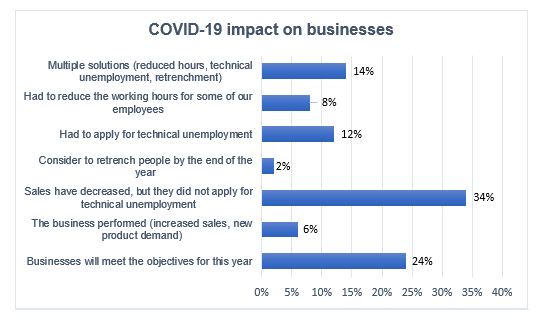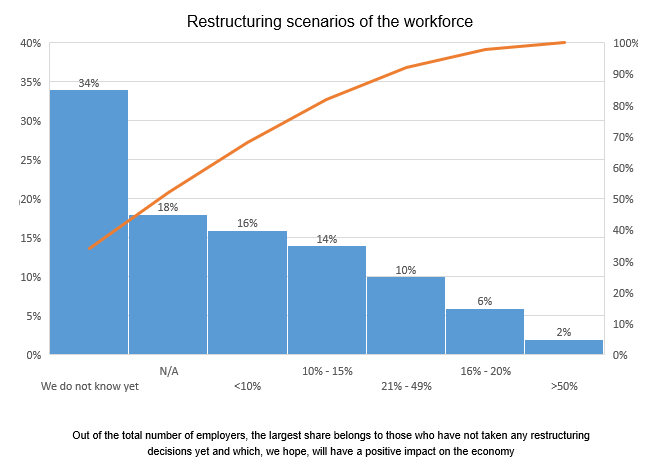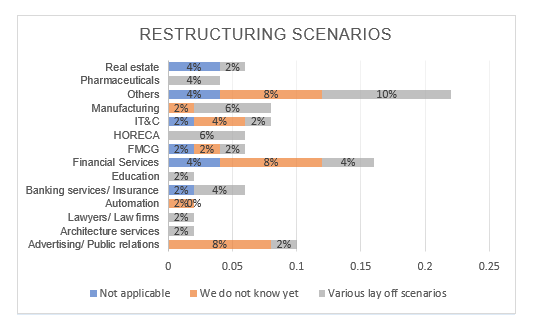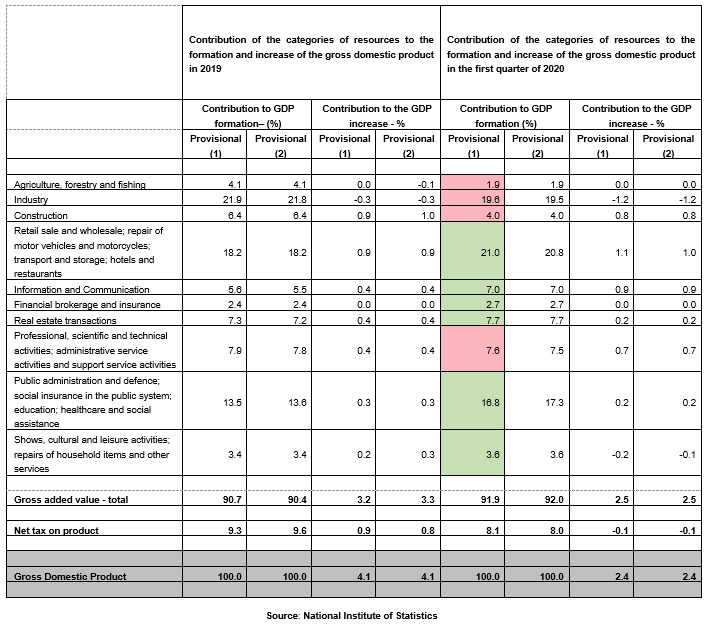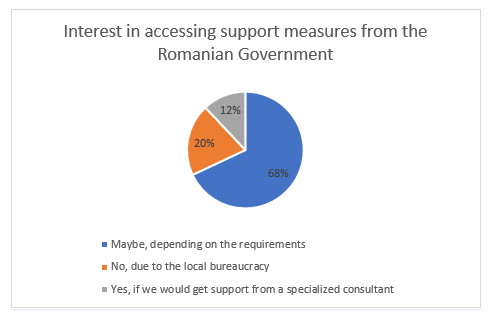
The interest of the Romanian business environment regarding the EU SURE initiative
At the beginning of July, the Romanian Government announced the National Plan for Investments and Economic Recovery, created to support the entire business environment. The Government’s support has been structured around three financing sources, namely: non-reimbursable European funds (POCU), SURE program of the European Commission, and the State budget/ Unemployment insurance budget.
Two weeks ago, Mazars launched a market study with the scope of identifying the efforts and challenges of the Romanian business environment in managing the critical period we are going through, and the results can be of help in shaping the response of the Government. We emphasize that only decision-making representatives (i.e. General Managers, Chief Financial Officers, and Human Resource Managers) were invited to take part in this survey, given their overview on the performance registered in over 500 companies throughout the country from all sectors of activity so that the results therein would be relevant.
The impact of the health crisis generated by COVID-19 on companies differs:
1) 6% of the participating companies identified opportunities during this period, which led to the growth of their business, whether we are talking about increased sales or identifying new products that they have launched or will launch on the market;
2) For 24% of the companies, the crisis does not generate any impact, either positive or negative, they expect to manage delivering the budgeted performance until the end of the current year;
3) For the rest of 70% of the participating companies, COVID-19 crisis has so far led to a decrease in turnover, but their reaction to the current situation varies:
- 34% of the companies did not take any measures;
- 14% of the companies applied various measures to overcome this period (technical unemployment, short-time work for some of the employees);
- 2% applied technical unemployment;
- 8% had to reduce the working hours for some of the employees;
- 2% of the companies have already considered the restructuring of employees until the end of the year.
“One of the measures included in the National Plan for Investments and Economic Recovery refers to the implementation of a flexible work system[1].Based on this, the partial compensation of monthly income for the employees who will have reduced working hours in companies affected by the crisis would be made from funds made available by the State. In this context, we have also investigated scenarios with a negative impact on the employees in the absence of governmental measures. Thus, for 18% of the participating companies which have modelled various financial scenarios for the current year, restructuring of employees is not included in the agenda for 2020. Also, for 34% of the companies, no decision has been made yet, the financial situation would be re-examined each month until the end of the year. Finally, 48% of the companies ran various scenarios for reduction of their workforce by 10%, 15%, 20%, or even 50%.”, mentioned Andreea Georgescu, Head of HR Advisory, Mazars Romania.
“It is interesting that those who will implement these measures in the absence of clear support from the Government are not only those operating in HoReCa, which was, overall, the industry most affected by the restrictions imposed in the context of the health crisis, but also in other industries (Financial Services, IT&C, Manufacturing, FMCG, Banking/ Insurance services, Real estate, Pharmaceuticals, Architecture services, Education, Advertising/ Public relations) with up to 500 employees. We may draw the preliminary conclusion that the short-time working arrangement in question should be widely applied, but it would be recommended to conduct an impact study on the contribution of each industry to the GDP and the dynamics in the current context.”, mentioned Lucian Dumitru, Senior Manager, Tax Advisory, Mazars Romania.
Seeing the data published by the National Institute of Statistics for 2019 and the first quarter of 2020, we draw the attention that not only the economic operators from HoReCa need financial support in this period, but also the economic operators in agriculture, forestry and fishing, industry and constructions could be the beneficiaries of the EU SURE[2] program, taking into account the decrease of their contribution to Romania’s GDP in the first quarter of 2020, as compared to 2019.
An alarm signal raised from the response of the participating companies is related to their reluctance in accessing the funds which will be available, because of the bureaucracy they foresee, taking into account their experience from the usual interaction with the public administration. This concerns 20% of the participants who consider from the beginning that accessing such funds will involve bureaucracy and 68% which have not provided an answer yet, but which are waiting to see the conditions for the application of the program. Only 12% of companies declared that they would like to access the program, even if they will have to request support from consultants for this.
Considering the existing legal framework, as well as the practice that has already been proven to be effective in other countries to stimulate the rate of absorption of the workforce available in the market, the conditions for accessing the EU SURE funds should also cover other variables that are missing from the plan communicated by the Government. Here are some questions that need to be answered:
- Which are the measures which will be applied for the graduates who do not choose entrepreneurship?
- Which are the measures which will be applied for persons who are not currently part of the employment process or who want to return to employed status? We refer here to disabled persons, persons who gave up their job to take care of their family and who may now wish/need to return to part-time employment.
- Will people who already are subject to a tax exemption also benefit?
- What will be the eligibility criteria for companies to access these funds?
- The measures will be applicable only for the companies which have a council of the employees or a collective employment agreement?
For some of these questions to be answered, we are waiting for the publication in the Official Gazette of the Emergency Ordinance approved by the Government on the 31st of July on the application of the short-time working arrangement.
Starting July 15th, the Government of Romania extended the state of alert by 30 days. The current restrictions are kept, and the companies have to go once again through the following months with a lot of uncertainties. The first steps towards the reconstruction of the economy were made and the path will be challenging.
[1] Kurzarbeit Model – a short-time work schedule in situations of national crisis, with the costs shared between the employer and the Government.
[2] Financing program set up by the European Commission that allows Member States to access loans at advantageous rates, in order to reduce the social and economic impact of the pandemic, through implementation of short-time working (STW) arrangements or other similar measures.
Media Contact
Emilia Popa, Head of Marketing and Communication, Mazars Romania
Emilia.Popa@mazars.ro | +40741.111.042
About Mazars
Mazars is an internationally integrated partnership, specializing in audit, accountancy, advisory, tax, and legal services. Operating in 91 countries and territories around the world, we draw on the expertise of 40,400 professionals – 24,400 in the Mazars integrated partnership and 16,000 via the Mazars North America Alliance – to assist clients of all sizes at every stage in their development.
In Romania, Mazars has 25 years of experience in audit, tax advisory, financial advisory services, HR advisory, and accounting & payroll services. The local team has 230 professionals.
www.mazars.ro | https://www.linkedin.com/MazarsRomania/
WANT TO KNOW MORE?


